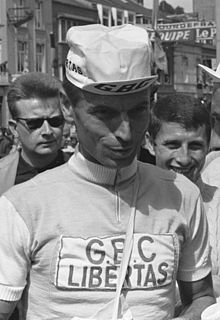
Chateau d'Ax was an Italian professional cycling team that existed from 1983 to 1993, when it was succeeded by Team Polti. Among its various sponsors was Chateau d'Ax, an Italian furniture manufacturer.

Legnano was an Italian professional cycling team active from 1906 to 1966. It is ranked as the 6th most successful cycling team in history. Many famous cyclists rode for the team including Alfredo Binda, Learco Guerra, Gino Bartali and Fausto Coppi. The team participated in the Giro d'Italia 46 times, won the team classification 11 times and earned 135 stage wins. It was sponsored by Italian bicycle motorcycle manufacturer Legnano.

Televizier was a Dutch professional cycling team that existed in part from 1961 to 1967. It was sponsored by Dutch television listings magazine Televizier.

Groene Leeuw was a Belgian professional cycling team that existed from 1945 to 1969. Its main sponsor was Belgian bicycle manufacturer Groene Leeuw. Among the various co-sponsors was the Belgian beer Wiel's. In the 1960 Vuelta a España, the team finished with the top two placings in the general classification of the 1960 Vuelta a España, with Frans De Mulder first and Armand Desmet second.

Saint-Raphaël was a French professional cycling team that existed from 1954 to 1964. Its main sponsor was French apéritif brand Saint-Raphaël. From 1959 to 1961, a sister team existed, Rapha–Gitane–Dunlop.

Solo–Superia was a Belgian professional cycling team that existed from 1961 to 1966. Its main sponsor was Belgian margarine manufacturer Solo. Its most notable wins were the 1965 Paris–Roubaix with Rik Van Looy and the 1966 Tour of Flanders with Edward Sels.

Smith's was a Belgian professional cycling team that existed from 1966 to 1968. Its co-sponsor for the first two seasons and sole sponsor for the final season was the British company Smith's Potato Crisps.

Dr. Mann was a Belgian professional cycling team that existed from 1960 to 1970. Its main sponsor was proprietary medicine producer Dr. Mann. Its most notable victory was Herman Van Springel's win of the 1968 Giro di Lombardia.

Willem II–Gazelle was a Dutch professional cycling team that existed from 1966 to 1971. Its main sponsor was Dutch cigar maker Willem II and the co-sponsor was bicycle manufacturer Gazelle. Their most successful rider was Rik Van Looy, whose most notable wins with the team were the 1967 Paris–Tours, the 1968 La Flèche Wallonne and the 1969 E3 Prijs Vlaanderen. Harry Steevens won the 1968 Amstel Gold Race with the team.
DAF Trucks was a Belgian professional cycling team that existed from 1979 to 1983. Its main sponsor was Dutch truck manufacturing company DAF Trucks.

Frisol was a Dutch professional cycling team that existed from 1973 to 1977. Its main sponsor was Dutch oil trader Frisol. Its most notable victory was Jan Raas's win of the 1977 Milan–San Remo.

Fagor was a Spanish professional cycling team that existed from 1966 to 1969. Its main sponsor was Spanish domestic and commercial appliance manufacturer Fagor.

Fagor was a French professional cycling team that existed from 1985 to 1989. Its main sponsor was Spanish domestic and commercial appliance manufacturer Fagor.

La Redoute was a French professional cycling team that existed from 1979 to 1985. Its main sponsor was French mail order company La Redoute, with French bicycle manufacturer Motobécane a co-sponsor between 1979 and 1983.
Miko–de Gribaldy was a Belgian professional cycling team that existed from 1974 to 1976. The directeur sportif was former professional rider Jean de Gribaldy, who gave his name to the team. For the final year-and-a-half of its history, its main sponsor was French ice cream manufacturer Miko, whose part-owner, Louis Ortiz, was a friend of de Gribaldy. Its most notable victory was the 1974 Liège–Bastogne–Liège with Georges Pintens.
IJsboerke was a Belgian professional cycling team that existed from 1973 to 1982. Its main sponsor from 1973 to 1980 was Belgian ice cream manufacturer IJsboerke. In 1981 and 1982, its main sponsor was juice drink brand Capri Sun. Walter Godefroot won the 1978 Tour of Flanders with the team.

Lejeune–BP was a French professional cycling team that existed from 1976 to 1978. Its sponsors were Cycles Lejeune and BP.

Aki–Safi was an Italian professional cycling team that existed from 1989 to 1997. From 1989 to 1993, its sponsors were Italian kitchen components manufacturer Jolly Componibili and Montenegrin beach resort Club 88.
Tulip Computers was a Belgian professional cycling team that existed from 1990 to 1992. Its main sponsor was Dutch computer manufacturer Tulip Computers. This team should not be confused with the Spanish cycling team sponsored by Tulip Computers in 1990.
Weinmann was a Belgian professional cycling team that existed from 1989 to 1991. Its main sponsor was German bicycle parts manufacturer Weinmann.
















